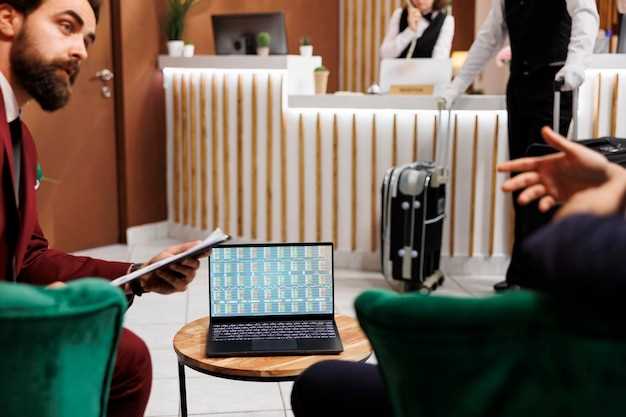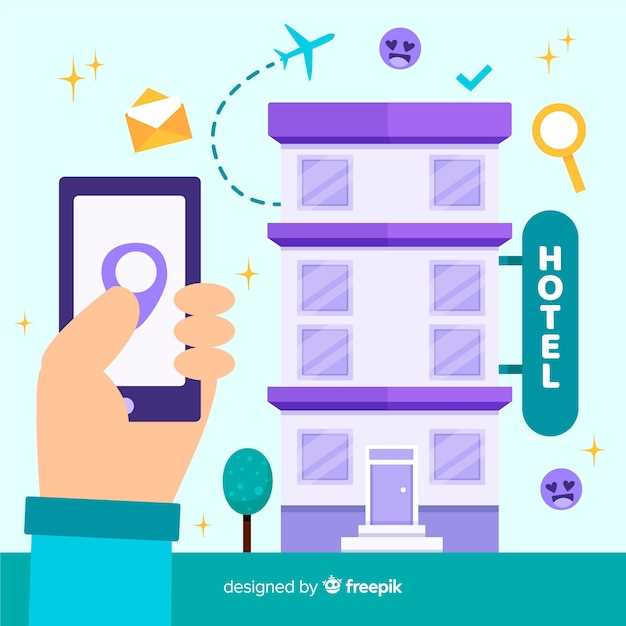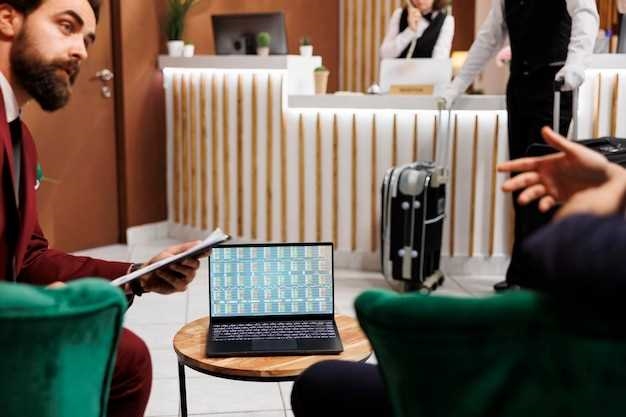
In today’s ever-evolving world, the hospitality industry is constantly seeking new ways to elevate the guest experience. By seamlessly integrating state-of-the-art technology and embracing digital advancements, hotels are revolutionizing the way they cater to their patrons. This paradigm shift not only enhances customer satisfaction but also sets a new standard for excellence in the industry.
With the advent of intelligent solutions, hotels are now able to provide a personalized and immersive experience to their guests. Gone are the days of generic services; instead, establishments are leveraging smart technologies to tailor their offerings to individual preferences. From smart room controls to personalized recommendations, these innovations create a seamless and unforgettable stay for every guest.
Embracing digital amenities has become a cornerstone of modern hospitality. The integration of cutting-edge technologies allows hotels to offer a wide range of services at the touch of a button. Whether it’s ordering room service through a mobile app or accessing virtual concierge services, guests can now enjoy a level of convenience and efficiency that was previously unimaginable.
Furthermore, the integration of technology in hotels not only enhances the guest experience but also streamlines operations behind the scenes. From automated check-ins to smart energy management systems, these solutions optimize efficiency and reduce costs for hoteliers. By embracing these digital transformations, hotels can focus on what truly matters – providing exceptional service and creating memorable experiences for their guests.
Streamlining Check-in and Check-out Processes
Efficiently managing the check-in and check-out processes is crucial for hotels to provide a seamless and hassle-free experience for their guests. This section explores innovative ways to streamline these processes using technology integration and smart solutions.
One of the key aspects of enhancing the guest experience is minimizing the time spent on check-in and check-out procedures. By leveraging technology, hotels can automate these processes, reducing waiting times and improving overall efficiency. Digital self-check-in kiosks and mobile check-in apps are examples of smart solutions that allow guests to complete the necessary procedures quickly and conveniently.
With the integration of advanced software systems, hotels can also optimize their front desk operations. By utilizing guest management platforms, staff can access real-time information about room availability, guest preferences, and special requests, enabling them to provide personalized services and anticipate guests’ needs. This not only enhances the efficiency of the check-in process but also contributes to a more personalized and memorable stay for guests.
In addition to streamlining check-in, technology integration can also simplify the check-out process. Digital payment systems and mobile check-out apps enable guests to settle their bills securely and efficiently, without the need for lengthy queues at the front desk. By offering contactless payment options and digital invoices, hotels can enhance the overall guest experience and ensure a smooth departure.
| Benefits of Streamlining Check-in and Check-out Processes |
|---|
| 1. Time-saving for guests |
| 2. Improved operational efficiency |
| 3. Enhanced guest satisfaction |
| 4. Personalized services |
| 5. Secure and convenient payment options |
In conclusion, integrating technology and smart solutions into the check-in and check-out processes can significantly enhance the guest experience in hotels. By streamlining these procedures, hotels can save time, improve operational efficiency, provide personalized services, and ensure a seamless departure for their guests.
Personalizing the Guest Experience through Mobile Apps
Creating a unique and tailored experience for each guest is a crucial aspect of modern hospitality. In today’s digital age, mobile apps have emerged as powerful tools for personalizing the guest experience in hotels. By leveraging the capabilities of mobile technology, hotels can offer a range of personalized services and amenities that cater to the individual preferences and needs of their guests.
Mobile apps provide a convenient platform for guests to access a variety of personalized features and services during their stay. Through these apps, guests can easily customize their experience by selecting their preferred room amenities, such as room temperature, lighting, and entertainment options. They can also request specific services, such as housekeeping, room service, or spa appointments, with just a few taps on their mobile devices.
Furthermore, mobile apps enable hotels to gather valuable data about their guests’ preferences and behaviors. By analyzing this data, hotels can gain insights into individual guest preferences, allowing them to offer personalized recommendations and suggestions. For example, if a guest frequently orders vegetarian meals through the app, the hotel can proactively suggest nearby vegetarian restaurants or offer customized menu options.
In addition to personalized services, mobile apps can enhance the overall guest experience by providing real-time information and updates. Guests can receive notifications about upcoming events, promotions, or changes in hotel services, ensuring they are always well-informed. Moreover, mobile apps can serve as virtual concierges, offering recommendations for local attractions, restaurants, and activities based on the guest’s interests and preferences.
By embracing mobile app technology, hotels can elevate the guest experience to new heights. The ability to personalize services, gather valuable data, and provide real-time information empowers hotels to create memorable and tailored experiences for each guest. In an increasingly competitive industry, integrating mobile apps into hotel operations is a smart solution for enhancing guest satisfaction and loyalty.
Enhancing Communication with Guests via Chatbots

In this section, we will explore the innovative use of chatbots to improve communication between hotels and their guests. Chatbots, also known as virtual assistants or AI-powered messaging systems, have revolutionized the way hotels interact with their customers. By leveraging advanced technology, hotels can provide personalized and efficient communication channels that enhance the overall guest experience.
Streamlining Guest Inquiries and Requests
One of the key benefits of integrating chatbots into hotel operations is their ability to streamline guest inquiries and requests. Instead of waiting in long queues or navigating through complex phone menus, guests can simply engage with a chatbot through a messaging platform. These chatbots are equipped with natural language processing capabilities, allowing them to understand and respond to guest queries in a conversational manner. By providing quick and accurate information, chatbots can significantly reduce response times and enhance guest satisfaction.
Personalized Recommendations and Assistance
Another advantage of using chatbots in hotels is their ability to provide personalized recommendations and assistance. Through machine learning algorithms, chatbots can analyze guest preferences and past interactions to offer tailored suggestions for dining, entertainment, and local attractions. Whether it’s recommending a nearby restaurant based on dietary preferences or suggesting activities based on previous bookings, chatbots can enhance the guest experience by providing relevant and customized information.
Furthermore, chatbots can also assist guests during their stay by providing real-time support and assistance. From room service requests to booking spa appointments, chatbots can handle a wide range of tasks, freeing up hotel staff to focus on more complex guest needs. This not only improves operational efficiency but also ensures that guests receive prompt and accurate assistance whenever they need it.
In conclusion, the integration of chatbots in hotels offers a multitude of benefits for enhancing communication with guests. By streamlining inquiries and requests, as well as providing personalized recommendations and assistance, chatbots can significantly improve the overall guest experience. With their advanced technology and natural language processing capabilities, chatbots have become valuable tools in the hospitality industry, revolutionizing the way hotels interact with their guests.
Implementing Smart Room Controls for Convenience and Comfort
In this section, we will explore the implementation of intelligent room controls to enhance the convenience and comfort of hotel guests. By integrating cutting-edge technology into the room infrastructure, hotels can provide a seamless and personalized experience for their guests.
Enhancing Convenience with Smart Room Controls
Smart room controls offer a range of features that make it easier for guests to navigate and customize their room environment. With intuitive interfaces and voice-activated commands, guests can effortlessly adjust the lighting, temperature, and entertainment systems to their preferences. These smart controls eliminate the need for manual adjustments and provide a more convenient and efficient experience.
Furthermore, smart room controls can also integrate with other hotel services, such as room service or housekeeping. Guests can use the controls to request amenities, schedule wake-up calls, or even communicate with hotel staff. This integration streamlines the guest experience and ensures that their needs are met promptly and efficiently.
Enhancing Comfort with Smart Room Controls
Smart room controls go beyond convenience and also contribute to the overall comfort of hotel guests. By allowing guests to personalize their room environment, these controls create a more relaxing and enjoyable stay. Guests can adjust the lighting to create a cozy ambiance, control the curtains or blinds for privacy, and even set their preferred music or TV channels.
Moreover, smart room controls can also adapt to individual preferences and habits. For example, the controls can learn a guest’s preferred temperature settings and automatically adjust the room temperature accordingly. This level of personalization enhances the comfort of the guest and creates a sense of being catered to.
In conclusion, implementing smart room controls in hotels offers a multitude of benefits for both guests and hotel management. By providing convenience and comfort through intuitive interfaces and personalized settings, hotels can elevate the guest experience and differentiate themselves in a competitive market.
Utilizing Virtual Reality for Interactive Hotel Tours

Incorporating cutting-edge technology into the hospitality industry has revolutionized the way hotels engage with their guests. One such innovation that has gained significant traction is the utilization of virtual reality (VR) for interactive hotel tours. This immersive experience allows potential guests to explore the hotel’s facilities and amenities virtually, providing them with a realistic preview of their stay.
By harnessing the power of VR, hotels can offer a unique and captivating way for guests to familiarize themselves with the property before making a reservation. Through a combination of high-quality visuals, 360-degree views, and interactive features, VR tours enable guests to virtually walk through the hotel’s rooms, restaurants, spa, and other areas of interest. This technology creates a sense of presence and allows guests to envision themselves in the hotel, enhancing their decision-making process.
Moreover, VR tours can be customized to cater to different guest preferences and needs. For instance, guests can choose to explore specific areas of the hotel that are of particular interest to them, such as the fitness center or conference rooms. Additionally, hotels can incorporate interactive elements within the VR tour, such as clickable hotspots that provide additional information about certain amenities or services. This level of personalization enhances the overall guest experience and helps hotels stand out in a competitive market.
Furthermore, the integration of VR tours can also benefit hotel staff and management. By providing a virtual walkthrough of the property, new employees can familiarize themselves with the layout and facilities, enabling them to better assist guests and navigate the hotel efficiently. Additionally, hotel management can use VR tours as a tool for showcasing renovations or new additions to the property, allowing potential investors or partners to experience the changes firsthand.
| Benefits of Utilizing Virtual Reality for Interactive Hotel Tours: |
|---|
| 1. Enhanced guest decision-making process |
| 2. Customization options for personalized experiences |
| 3. Improved staff training and orientation |
| 4. Effective marketing tool for showcasing renovations |
In conclusion, the integration of virtual reality technology into hotel tours offers numerous advantages for both guests and hotel management. By providing an immersive and interactive experience, hotels can engage potential guests on a deeper level, increase their confidence in making a reservation, and ultimately enhance the overall guest experience.
Improving Guest Safety and Security with IoT Devices
Ensuring the safety and security of guests is of utmost importance in the hospitality industry. With the integration of IoT devices, hotels can enhance their ability to provide a secure environment for their guests. By leveraging the power of connected devices and intelligent systems, hotels can implement innovative solutions to address various safety and security challenges.
One key aspect of improving guest safety is the implementation of smart surveillance systems. IoT-enabled cameras and sensors can be strategically placed throughout the hotel premises to monitor and detect any suspicious activities. These devices can provide real-time alerts to hotel staff, enabling them to respond quickly and effectively to potential security threats. Additionally, the data collected by these devices can be analyzed to identify patterns and trends, helping hotels proactively address security risks.
Another area where IoT devices can significantly contribute to guest safety is through the implementation of smart access control systems. Traditional key cards can be replaced with IoT-enabled solutions such as mobile apps or wearable devices. These devices can provide secure and convenient access to guest rooms, ensuring that only authorized individuals can enter. Furthermore, these systems can track and record access activities, providing a comprehensive audit trail for security purposes.
IoT devices can also play a vital role in enhancing emergency response capabilities. Connected smoke detectors, fire alarms, and emergency buttons can instantly alert hotel staff and emergency services in case of any fire or medical emergencies. These devices can provide precise location information, enabling a swift and targeted response, ultimately minimizing the potential risks to guests.
Furthermore, IoT devices can be utilized to improve the overall safety of hotel facilities. For instance, connected sensors can monitor the air quality, temperature, and humidity levels in guest rooms, ensuring a comfortable and healthy environment. Additionally, IoT-enabled asset tracking systems can help prevent theft or loss of valuable hotel assets by providing real-time location information.
In conclusion, the integration of IoT devices offers immense potential for improving guest safety and security in hotels. By leveraging smart surveillance systems, smart access control, and emergency response capabilities, hotels can create a secure and protected environment for their guests. Furthermore, IoT devices can contribute to the overall safety and well-being of guests by monitoring and optimizing various aspects of hotel facilities.
